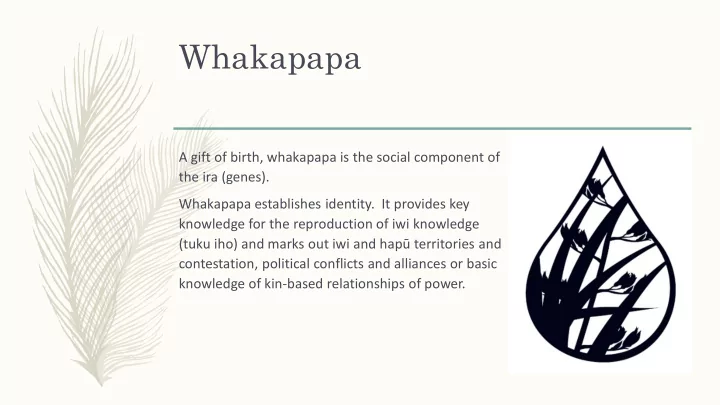

Whakapapa A gift of birth, whakapapa is the social component of the ira (genes). Whakapapa establishes identity. It provides key knowledge for the reproduction of iwi knowledge (tuku iho) and marks out iwi and hapū territories and contestation, political conflicts and alliances or basic knowledge of kin-based relationships of power.
Whanaungatanga Whanaungatanga embraces whakapapa and is centred on relationships, rights and obligations in a Māori context. As a spiritual concept it may be described as the ‘cement that holds things Māori together. Whanaungatanga is about being part of a larger whole of a collective. Whanaungatanga is about knowing that you are not alone, but that you have a wider set of acquaintances that provide support, assistance, nurturing, guidance and direction when needed.
Wairuatanga Wairuatanga or wairua is the spiritual dimension and things pertaining to the spirit of an individual or living being. Spirituality is the aspect of humanity that refers to the way individuals seek and express meaning and purpose and the way they experience their connectedness to the moment, to self, to others, to nature, and to the significant or sacred.
Manaakitanga Manaakitanga is the reciporical caring for others and the environment. Kindness, hospitality, treating people with respect and establishing nurturing relationships, manaakitanga is the value that underpins tikanga Maori.
Rangatiratanga Rangatiratanga is the exercise of leadership, authority, guardianship, and ownership rights; particularly focused on resource production, utilisation, and management for current and future requirements. This includes strategic development and oversight, relationships development and maintenance, problem-solving, conflict resolution and peace-making adaption, and management.
Mana Whenua The importance of the land and the environment is reflected through whakapapa, ancestral place names and tribal histories. The regard with which Māori held land was a reflectin of the close relationship that Māori had with the kawai tīpuna (ancestral lineage). As descendants of Ranginui and Papatuanuku and the kawai tīpuna, Māori maintained a continuing relationship with the land. Mana whenua is the collective right to exercise guardianship over the land.
Kaitiakitanga Kaitiakitanga is the exercise of guardianship, particularly in relation to natural resources. It is a way of managing the environment, based on the traditional M āori world view.
Recommend
More recommend